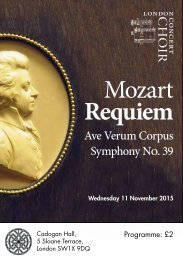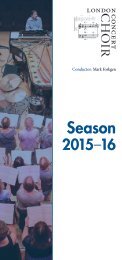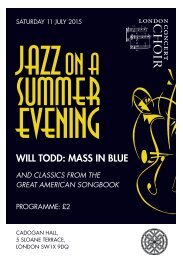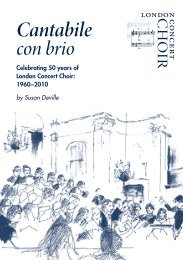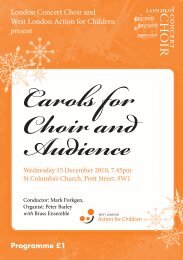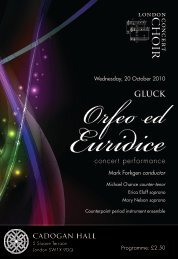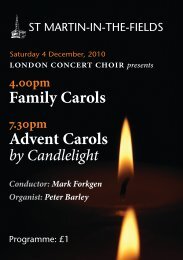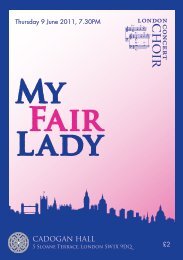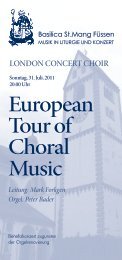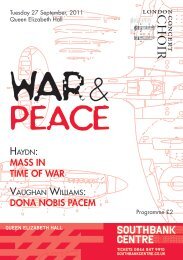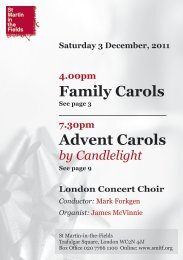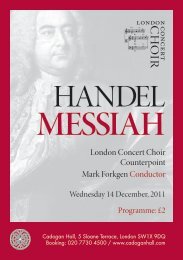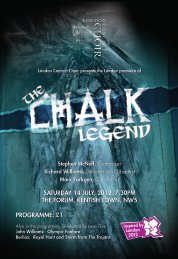10 March, 2015: Elijah (Mendelssohn)
You also want an ePaper? Increase the reach of your titles
YUMPU automatically turns print PDFs into web optimized ePapers that Google loves.
number of performances of the revised <strong>Elijah</strong> in England under the baton of the composer,<br />
and its publication in print. In November of that year, after a stroke, <strong>Mendelssohn</strong> died at<br />
the age of only thirty-eight, his premature death not only precipitated by the shattering loss<br />
of his beloved sister Fanny but also by the exertions of overwork.<br />
<strong>Mendelssohn</strong>’s oratorio is much influenced by Handel and Bach, composers he came<br />
to appreciate from a young age, when he was a pupil at Carl Zelter’s Singakademie in<br />
Berlin. As a twenty-year old, <strong>Mendelssohn</strong> had put on the first performance of Bach’s<br />
St Matthew Passion since the composer’s death in 1750, thus initiating a revival of interest in<br />
Bach’s music. The sense of drama in <strong>Elijah</strong>, for example in the different roles that the choir<br />
plays – sometimes part of the action, sometimes reinforcing what has been expressed in the<br />
arias, sometimes standing aside and providing spiritual advice – goes back to his Baroque<br />
predecessors. <strong>Mendelssohn</strong> is clearly indebted to Bach in his masterly fugal writing, as in<br />
the depiction of an increasingly angry crowd in the chorus ‘Woe to him!’ with its insistence<br />
on the words ‘And why’. An echo of Bach’s St John Passion and its famous ‘Es ist vollbracht’<br />
(It is finished) can be heard in <strong>Elijah</strong>’s ‘It is enough’, the only aria in <strong>Mendelssohn</strong>’s oratorio<br />
with a solo instrumental obbligato. But while <strong>Mendelssohn</strong> builds on the great oratorios<br />
of the past, he develops the form in several innovative ways, integrating a variety of styles,<br />
from the symphonic to the intimacy of Lieder-like arias.<br />
Unlike his earlier oratorio St Paul, <strong>Elijah</strong> has no narrator. <strong>Mendelssohn</strong> varies the style<br />
of the recitatives to help maintain the dramatic tension which he builds right from the<br />
beginning. The story of the prophet <strong>Elijah</strong> does not have a continuous narrative, but consists<br />
of a series of episodes. Nevertheless the composer creates an overarching structure from<br />
the Introduction in which the prophet delivers God’s curse of a drought on the Israelite<br />
kingdom of Ahab and his queen Jezebel for having established the worship of Baal, through<br />
various confrontations in which <strong>Elijah</strong> proves the true power of Jehovah, the God of Israel’s<br />
forefathers, the overcoming of his doubts about the effectiveness of his endeavours, to his<br />
final ascent into heaven in a fiery chariot. The theme that binds the narrative together is<br />
faith. <strong>Mendelssohn</strong> divides <strong>Elijah</strong> into two parts, quite different in character.<br />
PART ONE<br />
The highly dramatic nature of the First Part is established right at the beginning of the<br />
oratorio: instead of the expected overture <strong>Elijah</strong>, sung by a bass, intones the curse of a<br />
drought against Israel for having turned to a heathen god, set to a sinister series of tritones,<br />
before the overture develops this motif, depicting the years of suffering that follow and




